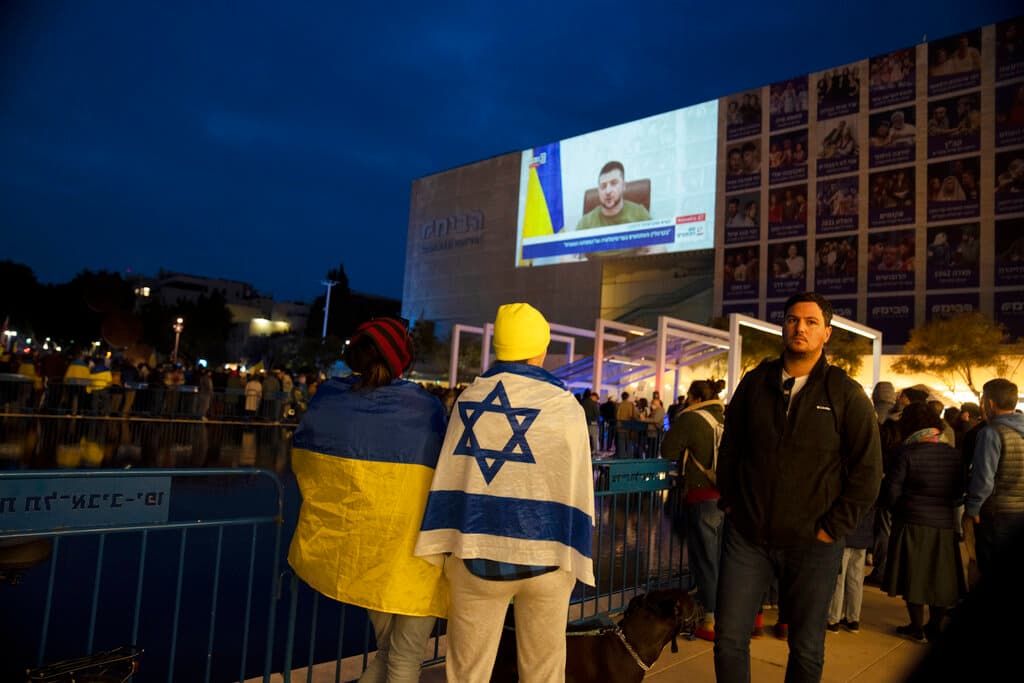Zelensky’s Request To Visit Israel Could Suggest a Warming Alliance
Kyiv and Jerusalem both see themselves as under attack, suggesting a thaw in relations could be at hand.

The request from President Zelensky to visit Israel sets up a dramatic visit from the leader of one war-ravaged country to another just as the Ukrainian leader seeks more aid from Western powers before winter hits.
On Wednesday, Mr. Zelensky sent an official request to visit Israel to the office of Prime Minister Netanyahu on Wednesday to visit Israel. Axios first reported that overture. A day before that request surfaced, Mr. Zelensky said he fears Russia is “inciting war in the Middle East” to “erode global unity,” an erosion that would have consequences for the world’s support for Ukraine.
According to Israeli and Ukrainian officials, planning for the trip is still inchoate, and there is no date scheduled for a visit. Addressing the press at Brussels on Wednesday, Mr. Zelensky emphasized the importance of Jerusalem not being isolated and urged other world leaders to visit Israel to “show their support for the people.”
Mr. Zelensky also reflected on the connection between the two conflicts. On Wednesday, during a meeting with Prime Minister De Croo of Belgium he called President Putin and Hamas “terrorists” that want to “hold free and democratic nations as hostages.” He also emphasized the need to stay united as Russia seeks to divide the alliance in Europe and fracture global consensus. “Russia’s counting on it, on dividing support,” Mr. Zelensky said.
Russia “still has enough resources to incite conflicts and turn them into full-scale tragedies. This is happening in the Sahel and it can happen even more painfully in Israel and in the Middle East as a whole. We must not allow this to happen,” Mr. Zelensky told NATO officials on Wednesday.
Mr. Zelensky was one of the first leaders to condemn Hamas’s attack. “In the face of such a terrorist strike, everyone who values life must stand in solidarity,” Mr. Zelensky said in a statement shortly after the attack on Saturday. “Israel has the full right to defend itself against terror.”
For the first time since Russia’s invasion, Mr. Zelensky on Wednesday made a surprise trip to Brussels to attend a meeting of the Ukraine Defense Contact Group, organized by the American secretary of defense, Lloyd Austin.
“We need some support from the leaders. That’s why I’m here today,” Mr. Zelensky said. “Air defense is a significant part of the answer to the question of when this war will end and whether it will end justly for Ukraine.”
A day before the meeting, Mr. Zelensky said he feared the war in Israel would divert attention from Russia’s invasion of Ukraine. “There is a risk that international attention will turn away from Ukraine, and that will have consequences,” Mr. Zelensky said in an interview with France 2 on Tuesday. Last year, Mr. Zelensky criticized Jerusalem for refusing to send weapons to Ukraine.
One military device Kyiv said Israel should donate to Ukraine is its advanced air defense systems, including the Iron Dome. Israeli officials said that they would need all the air defenses in their possession in case there is a war in Israel. Now, as rockets are constantly launched at Israeli cities, those stocks are dwindling, and America may well need to replenish them.
Israel’s self-defense would not overshadow Ukraine;s fight when it comes to American aid, Mr. Austin said. “Absolutely we can do both and we will do both,” he claimed. “We are the strongest nation in the world, and we are going to do what’s necessary to help our allies and partners.”
American officials announced Wednesday that they would send a $200 million military package to Ukraine that would include air defense weapons, rockets, and counter-drone equipment. Since the beginning of the war, Washington has sent about $70 billion in aid to Kyiv.
On Wednesday, the United Kingdom announced a new package of military support to Ukraine to help the soldiers clear minefields, maintain vehicles, and defend their infrastructure. Germany announced Tuesday that it would send a military package worth $1.1 billion, including missiles, ground vehicles, and air defense systems. Belgium said it could possibly supply F-16 jets to Ukraine in 2025.

